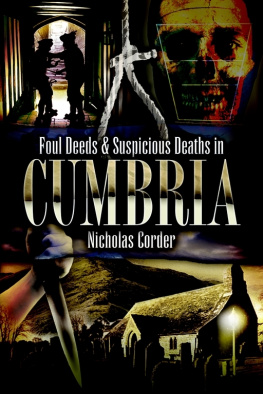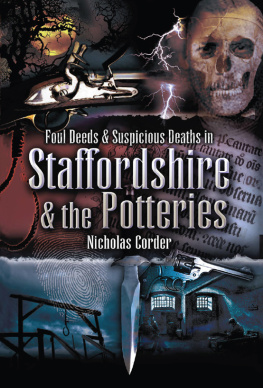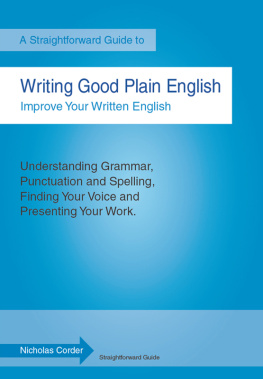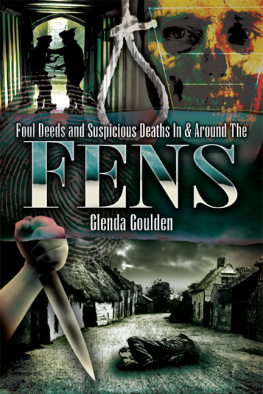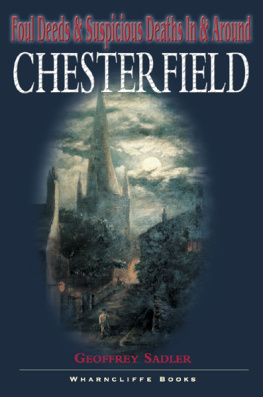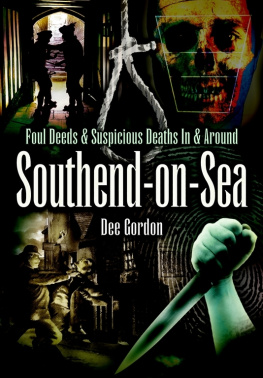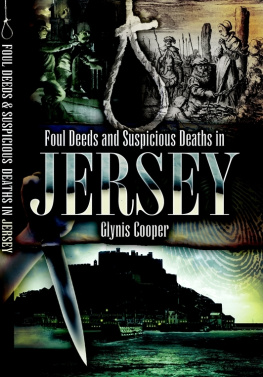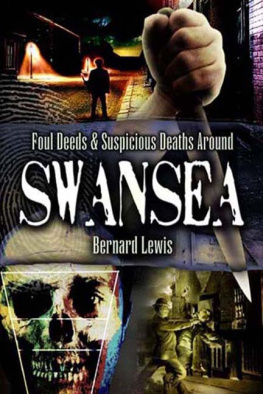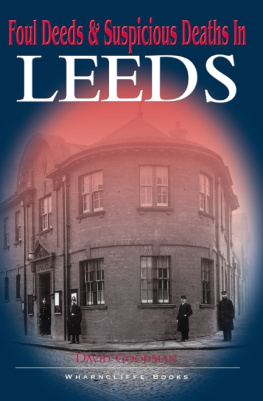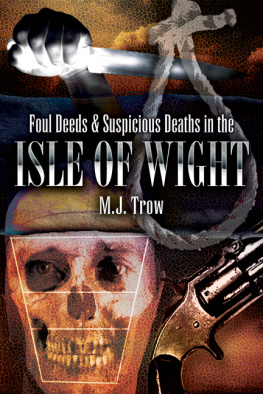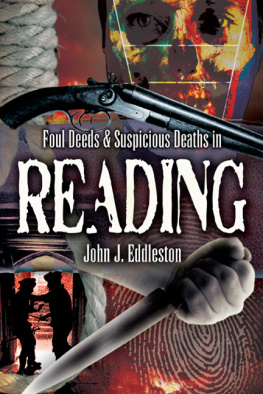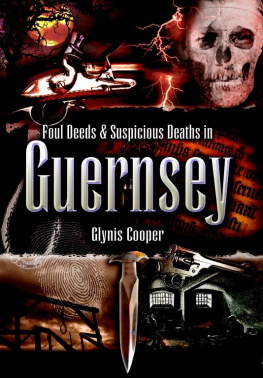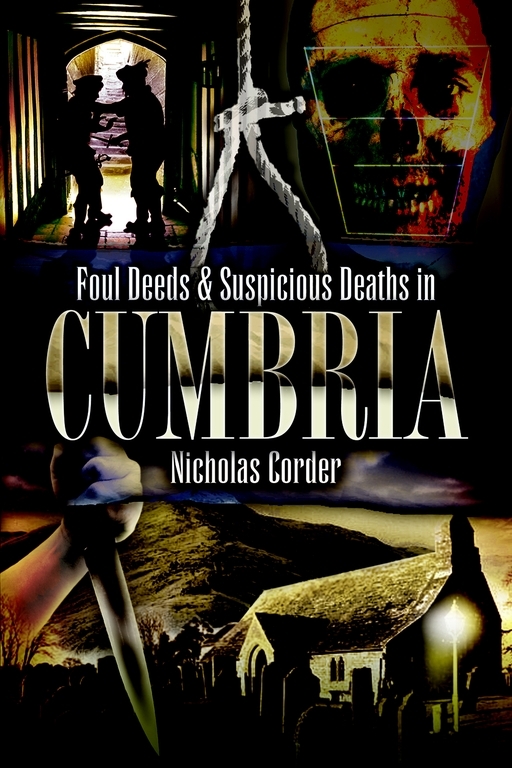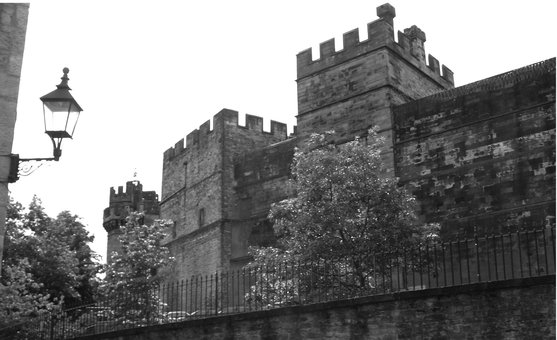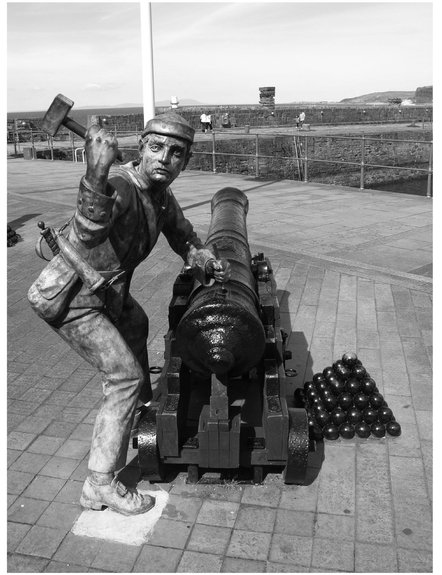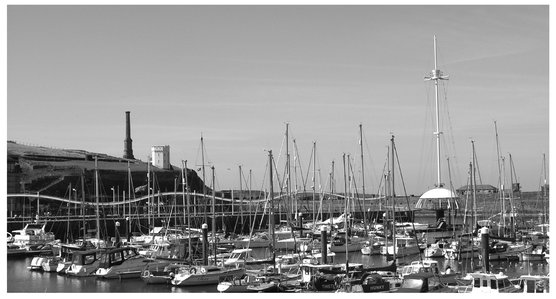Acknowledgements
S everal people helped in the writing of this book. The library staff of Kendal, and the staff at Preston, Whitehaven, Barrow and Carlisle archives have been as helpful as it is possible to be. Many thanks to them.
Tracey from Essex and Tony March put up (with) the travelling researchers as did Wadvern Davies, whilst Lesley Harris fed us. Keith Thomas not only ferreted out some stuff we had missed at the archives in Whitehaven, but paid for lunch as well. George Stewart of Burneside also dug up the tail-end of a case for us when we had run out of time in Kendal. Without them, two of the stories in this book wouldnt have made it into print. Ivor Davies read the manuscript looking for silly mistakes, so we all know who to blame if we find any.
Lastly, as ever, huge amounts of the research and typing were done by my wife, Pauline, who really should get a co-credit, but I like to keep all the royalties for myself. All photographs in this book are by the author.
Lancaster Castle. The castle served as gaol and assizes. Thomas Donahoo (Chapter 10), John Stainton (Chapter 9) and the suspects in the Trades Union murder (Chapter 15) all appeared here.
Bibliography
A Book of Trials Personal Recollections of an Eminent Judge of the High Court, Sir Travers Humphreys
A Census of Whitehaven, 1762
Anon The Life of Mary Robinson, the Celebrated Beauty of Buttermere; Containing an Account of the Frauds and Impositions Practised by John Hatfield, Commonly Called The Keswick Imposter also the Proceedings of His Trial, And an Account of His Execution
Anon The Trial of Thomas Wallis, Ann Heslop, Thomas Leeke Wilson, John Boustead and John Wilson for a Conspiracy &c. against one Jonathan Sewell
Ashbridge, Ian Murder in Cumbria
Bott, George Keswick: The Story of a Lake District Town
Eddlestone, John The Encyclopaedia of Executions
Gawalt, Gerard (translator & editor) John Paul Jones Memoir of the American Revolution
Hay, Daniel Whitehaven An Illustrated History
Klontz, Catherine The Embleton Murder
Koven, Mrs Reginald de The Life and Letters of John Paul Jones
Lee, Sarah Classic Murders of the North West
MacLeod, Innes Sailing on Horseback William Daniell and Richard Ayton in Cumbria and Dumfries and Galloway
Officer, Lawrence H Purchasing Power of British Pounds from 1264 to 2006 , Measuring Worth.com
Scott-Hindson, Brian Whitehaven Harbour
Stainton J M The Reverend John Stainton, 1785-1848, clerk, incumbent curate of Rampside
The Newgate Calendar
Newspapers and magazines
Lloyds Evening Post
New York Times
The Carlisle Journal
The Carlisle Patriot
The Cumberland Magazine
The Cumberland Pacquet
The Lancaster Gazette
The Police Gazette
The Times
The Whitehaven News
Time Magazine
Chapter 1
John Paul Jones and the Whitehaven Raid 1778
H e was the commander, so he was first into the fort. They didnt need the scaling ladders. Instead they stood on the shoulders of the biggest men in the landing party and broke through to capture the small group of look-outs manning the half-moon battery, stunned by the sudden presence of armed raiders.
These look-outs were supposed to be in charge of the thirty-six guns, fanned in an arc, pointing into the feeble light of an April dawn. These were the guns that were supposed to protect the harbour of Whitehaven. They werent going to defend anywhere tonight.
He had divided his landing party of three officers and twenty-nine men into two groups. Whilst he and his men were on the south side, silencing the guns, the other group in the smaller boat would by now be in place in the harbour itself. Lieutenant Samuel Wallingsford and Midshipman Ben Hill were in charge of this second group. They carried bits of canvas, dipped in brimstone, which they planned to set alight and throw onto the decks or amongst the rigging of the boats of large fleet that lay at rest in the harbour.
The commander of the raid was a small, fiery, red-headed Scot called John Paul Jones. He was daring, intrepid and ruthlessly ambitious to rise as far as he could above his humble beginnings as a gardeners son. He had, through a succession of adventures that had seen him serve on all kinds of merchant ships including slavers, found his way to America. As America geared itself for war against Britain, so Jones found his niche. Now he was Captain of The Ranger.
A modern day statue showing one of John Paul Joness men spiking the guns at Whitehaven.
Jones had spent the previous fortnight sailing the sloop from Brest towards the Irish Sea looking for opportunities to engage the British in battle. According to his own memoirs, he was ready to raid England on 17 April, but he was blown off course and found himself off the coast of Ireland. Here, he happened upon a British frigate, HMS Drake , in the port of Carrickfergus. He made plans to capture the frigate, but according to Ezra Green, the ships surgeon, the crew was unwilling to do so before dark. When they attempted to do so after nightfall, the mate had according to Jones drunk too much brandy, did not drop the anchor at the instant the order was given to him and the chance of capture was gone.
A few days after the aborted raid on Carrickfergus, Jones recorded in his memoirs that he attempted a second time to descend on England a plan that greatly alarmed his lieutenants: Their object, they said, was gain not honour. They were poor: instead of encouraging the morale of the crew, they excited them to disobedience; they persuaded them that they had the right to judge whether a measure that was proposed to them was good or bad.
In those days, crews were dependent for their money on ships they captured or sank and a raid on a town like Whitehaven would have merely put their lives in danger without any chance of making any money from it.
It was now the night of 22-23 April 1778, and Jones found himself opposite the harbour at Whitehaven a town he knew well. It was here that John Paul (as he then was) came in about 1761 as a lad of thirteen or fourteen, signing papers of apprenticeship to John Younger, a prominent local trader and civic dignitary. Over the next few years, he was to make at least four trips from Whitehaven to the Caribbean and Virginia, with cargoes of pig iron, barrel staves, salt, rum and sugar depending on the leg of the voyage.
Whitehaven Harbour as it is today.
Whitehaven had grown prosperous from the power of Britain as a sea-faring nation and from the richness of the minerals under the Cumbrian soil. The commercial possibilities brought about by the opening up of the new lands of the Americas and the Caribbean to the West turned the port of White haven, which also included the harbours along the Cumberland coast at Millom, Workington and Maryport, into one of the five most important ports in England. By the mid-eighteenth century, the newly-planned Georgian town of Whitehaven, the first planned town since the Middle Ages, was a wealthy sea-port in what was then the worlds wealthiest nation.

